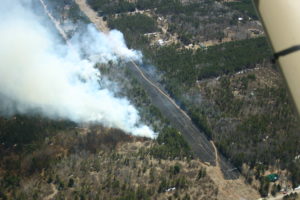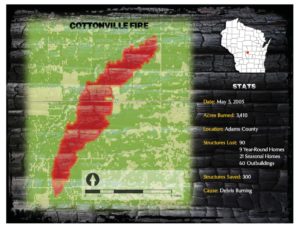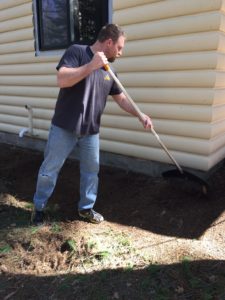
Van Beek Fire in the Town of Stephenson burned 20 acres on April 28, 2018.
In the past week, 161 wildfires burned 520 acres in DNR protection areas (approximately half the state); 88 homes and other buildings were threatened but saved with firefighter assistance and 15 buildings were destroyed. Debris burning was the most common cause (67 fires); other causes included equipment, power line, railroad, campfires, ash disposal, and smoking. The largest fire of the week burned 124 acres and threatened 13 buildings in Eau Claire County, the cause was debris burning. Fire danger ranged from Low to Extreme across the state, with Red Flag Warnings in several counties. As the vegetation dries out on the days we don’t receive rain, expect fire danger to increase, particularly in areas where standing dead grass and other dry vegetation remains.

Cottonville Fire in 2005
As vegetation greens up, people often become complacent and conduct their burning projects during the day instead of following the time restrictions on burning permits. In DNR protection areas, if you do choose to conduct outdoor burning, remember that a free annual burning permit is required to burn small piles of debris and to burn in a burn barrel. Burning permits are frequently suspended this time of year when fire danger increases. You must check the day’s burning restrictions every day you intend to burn by calling 1-888-WIS-BURN (947-2876) or by checking online at dnr.wi.gov, keyword ‘fire danger’. Larger piles and daytime burning requires a special permit from a DNR Ranger. Piling your debris in a campfire pit does not make it okay to burn during the day. If your property is outside a DNR protection area, check with local officials for burning restrictions.

Rake windblown leaves and needles away from the foundation of your home.
Firewise Tip: Homeowners are encouraged to make weekly checks around your home or cabin for windblown leaves and needles on your roof, around your foundation, and under decks and elevated porches; keep these areas clean. The debris that collects in these places could be easily ignited by flying embers produced during a wildfire.
